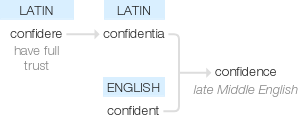Confidence
late Middle English: from Latin confidentia, from confidere ‘have full trust’ (see confident).
wiktionary
From Middle English confidence, from Latin cōnfīdentia (possibly via Old French confidence), from cōnfīdō(“believe, confide in”) from con-(“with”) + fīdō(“trust”).
Morphologically confide + -ence.
etymonline
confidence (n.)
c. 1400, "assurance or belief in the good will, veracity, etc. of another," from Old French confidence or directly from Latin confidentia, from confidentem (nominative confidens) "firmly trusting, bold," present participle of confidere "to have full trust or reliance," from assimilated form of com, here perhaps an intensive prefix (see com-), + fidere "to trust" (from PIE root *bheidh- "to trust, confide, persuade").
From mid-15c. as "reliance on one's own powers, resources, or circumstances, self-assurance." Meaning "certainty of a proposition or assertion, sureness with regard to a fact" is from 1550s. Meaning "a secret, a private communication" is from 1590s. The connection with swindling (see con (adj.)) dates to mid-19c. and comes from the notion of the false "trustworthiness" which is the key to the game.
